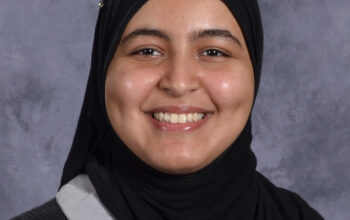
By Lindsay Doty
When Carlotta Berry, an electrical and computer engineering professor at Rose-Hulman Institute of Technology, started her career 20 years ago she was the only Black woman in her field. Two decades later, not much has changed but she’s working to encourage more diversity in her field.
“I’m the only black woman faculty member at Rose-Hulman. It’s me. That’s it,” said Berry, who is the first African-American female tenured and full professor at the school.
The Avon resident who has commuted to Terre Haute, Ind., over the years to teach courses in everything from human-robot interaction to electrical engineering design has a mission.
She wants everyone to know Black STEM — science, technology, engineering, and math — matters.
Berry is among the leaders of Black in Engineering, a national network of 400 Black engineering and computer science faculty across the country working to inspire positive change and stand in solidarity with Black people in America.
“I want to know I did something. It keeps me rejuvenated,” said Berry. “Not just for that little Black girl but also for that junior faculty member. I don’t want to keep hearing the same stories in 20 years.”
The group formed in 2020 amid the Black Lives Matter movement.
Black academics and scholars from across the country began discussing their shared experiences with discrimination through the hashtag #BlackInTheIvory.
“You didn’t see a lot of engineers from computer sciences,” Berry said. “The reason is there are so few of us.”
Berry teamed up with other professors in her field to discuss what they could do to improve the climate for STEM faculty.
The result has been a video series, co-produced by Berry, that approached topics like “What it means to be Black in Robotics.” The movement is gaining major traction on social media platforms, and Berry says much more is coming.
“We are now getting public speaking requests weekly,” said Berry. “We have received lots of positive responses, but most of all we want to see some changes in the academy.”
She says Black faculty represent only 2.4% of faculty in science, technology, engineering and mathematics (STEM) fields.
“Engineering has a severe marketing problem,” she said. “It’s always an image of little white boys with dad in the garage. It completely stigmatized the field.”
“There’s a lot of Dilbert and Sheldon,” she said, referring to two popular fictional engineering characters in pop culture. “There’s nothing wrong with that, but we need more than that.”
She’s working to inspire the next generation of engineers, no matter race or gender.
“Engineering is for anyone who wants to learn and has an interest.”
Berry has inspired students to learn by tinkering, hacking and making mistakes. During the pandemic, she shipped low-cost kits to students’ homes to keep up the skills.
“She organized a virtual student panel for my daughter during the pandemic that was instrumental in getting my daughter to come to Rose,” said engineering parent Karen Sleezer.
Berry is currently on sabbatical and working on software for Eli Lilly. She hopes to integrate the real-world lesson when she returns to the classroom.
Back in Hendricks County, where titles like “Dr. Berry” are left at the door in exchange for Carlotta or just “mom” she mentors in other ways.
Berry helped lead an all-girls robotics team with her daughter’s Girl Scout troop in Avon before COVID.
“Gamer Girlz is on hiatus with the pandemic, but we are coming back,” she said smiling.
For Berry, the engineering path wasn’t always the clear-cut choice.
As a young girl, she had her heart set on becoming a school teacher like her mom, a hard-working single mother who loved the classroom.
It wasn’t until a 10th grade a counselor suggested she pursue engineering because of her knack for science and math.
“I didn’t know what engineering was,” Berry said with a laugh.
“I went to a physical library and looked up ‘engineer,’” she said about the pre-Google days.
It wasn’t until Georgia Tech that Berry was sold on STEM.
But she often felt like an outcast.
“I wanted to change the face of engineering by showing that the profession could be cool, interesting, exciting, engaging and most importantly, diverse,” Berry said.
Berry seems to be doing just that. The 50-year-old prof who also enjoys reading steamy romance novels and dance classes at the Avon Y is anything but boring.
Her list of accolades to inspire change isn’t short.
She penned an opinion piece in 2012 for New York Times that highlights issues for women in electrical and computer engineering. She co-founded Rose-Hulman’s Building Undergraduate Diversity (RoseBUD) program, which encourages students from underrepresented groups toward STEM careers, and recently received the FIRST Robotics program’s Game Changer Award after being a volunteer and judge for robotics competitions throughout Indiana — to name a few.
For Berry, making a difference is the ultimate challenge.
“Diversity in STEM is not just important for inspiring future generations but also because diverse teams yield the best solutions to problems and make sure that they work for the largest group of people,” she said.
Getting to know Carlotta Berry
Best advice I ever received was:
Don’t select a career or a job for the money but in order to do what you love so that you would even be willing to do it for free if you did not have bills of course. This is how I feel about teaching engineering.
A person who inspires me:
Dr. Ayanna Howard is a Black woman roboticist at Georgia Tech who recently became dean of engineering at The Ohio State University. She inspires me because she was the first Black woman contemporary in robotics that I ever met.
I’m currently reading/watching:
I love to read romance novels, but most of my day now is working on my own novel about an African American female engineering professor. This is my first fictional book, and I am excited for it to be released to change the face of engineering. I also just finished a book by Dr. Ayanna Howard that addresses bias in AI (artificial intelligence) and the need for more diversity in AI and robotics, “Sex, Race and Robots.”
Favorite place to eat or hang out in Hendricks County:
Hendricks Regional Health YMCA group dance classes because before the pandemic this was my go-to place to exercise. It worked well for me because I hate exercise.
If I could tell my younger self something:
It would be to be confident in yourself and your abilities and know that you are more than enough so you should walk with your head held high and be proud of what you can accomplish.
My favorite robot technology is:
That’s a hard question to answer. Since my area is human-robot interaction, I think I like the technologies that afford more seamless or natural interaction with people, so I would say machine learning, natural language processing. But I am also a controls engineer, so I love the Boston Dynamics videos, which show the dog robot able to walk on ice and run and not fall over, even when kicked.
When I’m not working, I’m usually:
Watching reality TV, reading a romance novel or cross stitching.
My most rewarding career moment so far has been:
Being the first Black woman to earn tenure and promotion to full professor at Rose-Hulman.
Something new I’m trying is:
Being more engaged on social media and promoting and marketing myself. This is not common for many professors and STEM professionals, so it is a unique way to find collaborators, opportunities and to promote my work to a broader and more diverse audience.
The pandemic has taught me:
To live every moment to the fullest and seize opportunities when they come with no regrets. This is what we did with Black in Engineering and Black Engineering Faculty Speak, and it has proven to be so rewarding.


